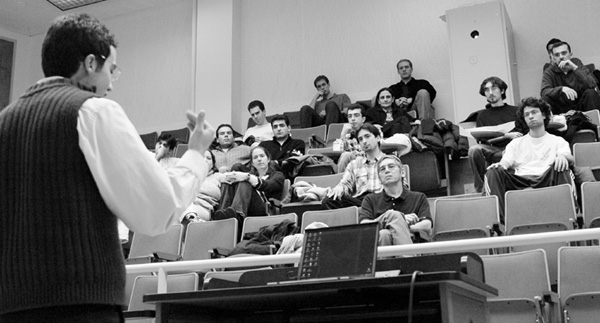Turks consider future amid area celebration

Alp Simsek, a Turkish Ph.D. student at the Massachusetts Institiute of Technology, introduces the documentary “Ataturk” to a group Nov. 21, 2005. (Photo: Schuyler Pisha)
The domain of the Ottoman Turks stretched from Austria to Iraq, from Algeria to Arabia, one of the greatest empires of the world. But by the dawn of the 20th century, Turkey was the “sick man of Europe,” diminished and corrupt and falling behind in an increasingly technological world.
It was one man who, nearly by force of personality, transformed a Moslem theocracy into a modern secular state, a leader in the technologies of the time: Mustafa Kemal Atatürk, intellectual, military and political genius, autocrat and democrat, and a visionary who engineered his culture to fit a modern world.
As the area nears the end of the monthlong 10th Annual Turkish Festival, more than 30 people – Turkish students and friends of Turkish culture – gathered Monday in a classroom at the Massachusetts Institute of Technology to watch Tolga Örnek’s biopic “Atatürk,” sponsored by the school’s Turkish Students Association. The association pulls together about 80 Turkish members of the school community for social and educational events.
After the film, five of the association’s young men met over steaming coffee to discuss the place of Turkey in history, today and, as the country awaits entry to the European Union, into the future.
The group had cautious hopes for Turkey joining the union. “It’s a very long process,” said Alp Simsek, an organizer for the school’s Turkish Students. “If Turkey keeps on doing what they are doing now, it will happen.”
These young students, all native to Turkey, noted that in Atatürk’s day, social standing and rank came from military training and service. But it was obvious some of today’s Turkish leaders will come from the ranks of science and technology – skills such as they are learning.
“What can we learn from the Turkish experience? Education pays off,” Simsek said, reflecting on how Turkey’s experience could serve as a model for nations such as Afghanistan and Iraq. “Even if people react to changes, they adapt and they get used to it. In the long run, we can expect Iraq to accept these values.”
But the students agreed the prognosis was less hopeful with reform imposed from outside.
“So many accepted these changes just because they liked Atatürk. If he said ‘Don’t wear the fez, wear a hat,’ they would wear a hat,” Simsek said, noting that Turkish secularization and modernization was led from within,
From page 1
by an intellectual military elite who imposed French-inspired enlightenment on their people to form the modern Turkish Republic.
Around the time of the fall of the Berlin Wall, some Eastern European youth carried pictures of Ronald Reagan in their wallets, Serkan Cabi remembered. President Bush, although he also seeks reform, Cabi commented archly, is not such a hero in Iraq. “Respect of the nation is important, and America is far, far from that.”
“People should travel to Turkey and see,” Inalhan said. “If there is a role model for Islamic people it is there, even in the smallest villages.”
“We feel that the countries in conflict today are where we were in 1920,” Ozgur Sahin said. “Afghanistan, for example. Reforms in Turkey allowed knowledge and freedom in.”
Ghokhan Inalhan thought Iraq would be a different problem. “Iraq was a created nation, in three parts, Sunni, Shiite and Kurd. For Turkey, the Ottoman Empire created a greater identity people could accept. In the film, ‘Atatürk,’ one of his daughters…noted [in reference to rights of women, including the vote] that ‘This was a right that was given to us; we did not fight for it.’ It takes time for a nation to absorb it.” He noted that in Turkey there were two coups rebelling against secular reform, but eventually it became a “natural development, absorbing the good.”
As in Iraq, there are Kurds in Turkey. And, while the group agreed there were ethnic tensions in Turkey, some of which are complicating the journey to membership in the European Union, the students considered the ethnic tensions to be the product only of geopolitical discrimination. In the east, where the economy has been neglected by administrations largely drawn from western Turkey, the Kurds are in revolt. In the western parts of the republic, the Kurds feel well treated, the students said, and it doesn’t really matter if one is Turk or Kurd or any other ethnicity.
“People think Turkey is just like Iran,” one complained. “They think Turks are Arabs.” But Turkey’s ties have always been as strong to Europe as to the Middle East or Central Asia, and the Turkish people are a diVerent people from Arabs. The language is not Semitic, and is written in a script more like English than like Greek or Arabic writing.
“A quarter of Europe was Ottoman,” Simsek said. “And we are and will be European.”
Tolga Örnek’s most recent documentary, “Gallipoli,” will screen at the Harvard Film Archive at 9 p.m. Friday in the Carpenter Center for the Arts.

